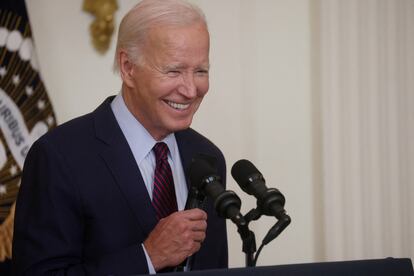Biden administration to target drugs for price negotiations to lower Medicare costs
The announcement is a significant step under the Inflation Reduction Act, which was signed by Biden last year

President Joe Biden’s administration will announce on Tuesday the first prescription drugs being targeted by the U.S. government for price negotiations as part of an effort to lower Medicare costs.
The announcement is a significant step under the Inflation Reduction Act, which was signed by Biden last year. The law requires the federal government for the first time to start negotiating directly with companies about the prices they charge for some of Medicare’s most expensive drugs.
The process has drawn legal challenges from drugmakers and heavy criticism from Republicans in Congress. It’s also a centerpiece of the Democratic president’s reelection pitch as he seeks a second term in office by touting his work to lower costs for Americans at a time when the country has struggled with inflation.
Biden plans to deliver a speech on health care costs from the White House after the announcement. He’ll be joined by Vice President Kamala Harris.
More than 52 million people who either are 65 or older or have certain severe disabilities or illnesses get prescription drug coverage through Medicare’s Part D program, according to the Centers for Medicare and Medicaid Services, or CMS.
About 9% of Medicare beneficiaries age 65 and older said in 2021 that they did not fill a prescription or skipped a drug dose due to cost, according to research by the Commonwealth Fund, which studies health care issues.
CMS aims to negotiate the lowest maximum fair price for drugs on the list released Tuesday. That could help some patients who have coverage but still face big bills like high deductible payments when they get a prescription.
Currently, pharmacy benefit managers that run Medicare prescription plans negotiate rebates off a drug’s price. Those rebates sometimes help reduce premiums customers pay for coverage. But they may not change what a patient spends at the pharmacy counter.
The new drug price negotiations aim “to basically make drugs more affordable while also still allowing for profits to be made,” said Gretchen Jacobson, who researches Medicare issues at Commonwealth.
Drug companies that refuse to be a part of the new negotiation process will be heavily taxed.
The pharmaceutical industry has been gearing up for months to fight these rules. Already, the plan faces several lawsuits, including complaints filed by drugmakers Merck and Bristol-Myers Squibb and a key lobbying group, the Pharmaceutical Research and Manufacturers of America, or PhRMA.
PhRMA said in a federal court complaint filed earlier this year that the act forces drugmakers to agree to a “government-dictated price” under the threat of a heavy tax and gives too much price-setting authority to the U.S. Department of Health and Human Services.
PhRMA representatives also have said pharmacy benefit managers can still restrict access to drugs with negotiated prices by moving the drugs to a tier of their formulary — a list of covered drugs — that would require higher out-of-pocket payments. Pharmacy benefit managers also could require patients to try other drugs first or seek approval before a prescription can be covered.
Republican lawmakers also have blasted the Biden administration for its plan, saying companies might pull back on introducing new drugs that could be subjected to future haggling. They’ve also questioned whether the government knows enough to suggest prices for drugs.
CMS will start its negotiations on drugs for which it spends the most money. The drugs also must be ones that don’t have generic competitors and are approved by the Food and Drug Administration.
CMS plans to meet this fall with drugmakers that have a drug on its list, and government officials say they also plan to hold patient-focused listening sessions. By February 2024, the government will make its first offer on a maximum fair price and then give drugmakers time to respond.
Any negotiated prices won’t take hold until 2026. More drugs could be added to the program in the coming years.
Sign up for our weekly newsletter to get more English-language news coverage from EL PAÍS USA Edition
Tu suscripción se está usando en otro dispositivo
¿Quieres añadir otro usuario a tu suscripción?
Si continúas leyendo en este dispositivo, no se podrá leer en el otro.
FlechaTu suscripción se está usando en otro dispositivo y solo puedes acceder a EL PAÍS desde un dispositivo a la vez.
Si quieres compartir tu cuenta, cambia tu suscripción a la modalidad Premium, así podrás añadir otro usuario. Cada uno accederá con su propia cuenta de email, lo que os permitirá personalizar vuestra experiencia en EL PAÍS.
¿Tienes una suscripción de empresa? Accede aquí para contratar más cuentas.
En el caso de no saber quién está usando tu cuenta, te recomendamos cambiar tu contraseña aquí.
Si decides continuar compartiendo tu cuenta, este mensaje se mostrará en tu dispositivo y en el de la otra persona que está usando tu cuenta de forma indefinida, afectando a tu experiencia de lectura. Puedes consultar aquí los términos y condiciones de la suscripción digital.








































